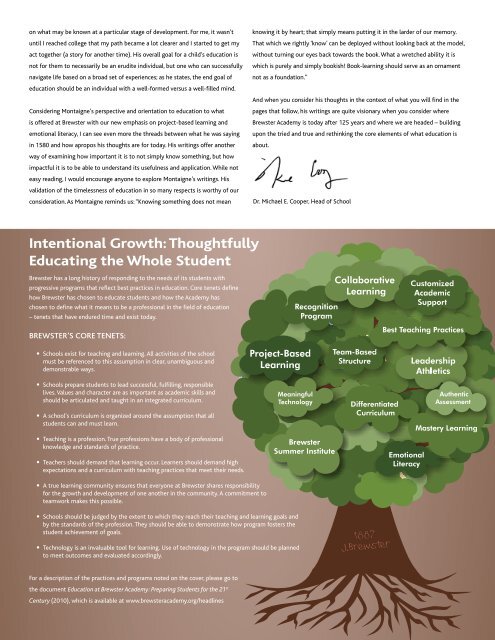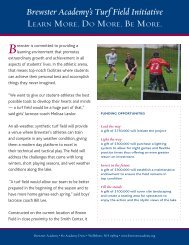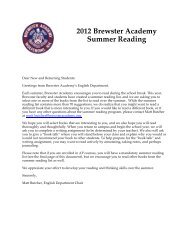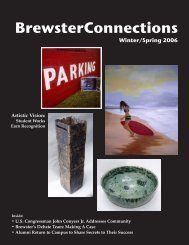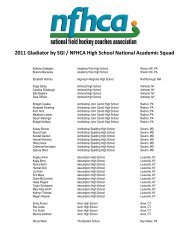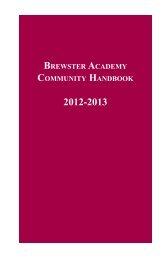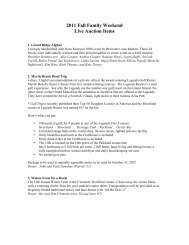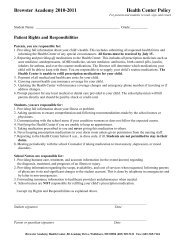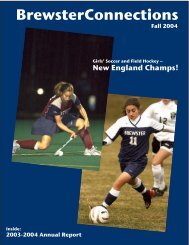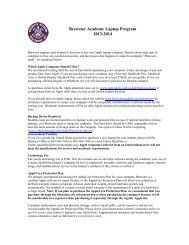BrewsterConnections(PDF) - Brewster Academy
BrewsterConnections(PDF) - Brewster Academy
BrewsterConnections(PDF) - Brewster Academy
Create successful ePaper yourself
Turn your PDF publications into a flip-book with our unique Google optimized e-Paper software.
on what may be known at a particular stage of development. For me, it wasn’t<br />
until I reached college that my path became a lot clearer and I started to get my<br />
act together (a story for another time). His overall goal for a child’s education is<br />
not for them to necessarily be an erudite individual, but one who can successfully<br />
navigate life based on a broad set of experiences; as he states, the end goal of<br />
education should be an individual with a well-formed versus a well-filled mind.<br />
Considering Montaigne’s perspective and orientation to education to what<br />
is offered at <strong>Brewster</strong> with our new emphasis on project-based learning and<br />
emotional literacy, I can see even more the threads between what he was saying<br />
in 1580 and how apropos his thoughts are for today. His writings offer another<br />
way of examining how important it is to not simply know something, but how<br />
impactful it is to be able to understand its usefulness and application. While not<br />
easy reading, I would encourage anyone to explore Montaigne’s writings. His<br />
validation of the timelessness of education in so many respects is worthy of our<br />
consideration. As Montaigne reminds us: “Knowing something does not mean<br />
knowing it by heart; that simply means putting it in the larder of our memory.<br />
That which we rightly ‘know’ can be deployed without looking back at the model,<br />
without turning our eyes back towards the book. What a wretched ability it is<br />
which is purely and simply bookish! Book-learning should serve as an ornament<br />
not as a foundation.”<br />
And when you consider his thoughts in the context of what you will find in the<br />
pages that follow, his writings are quite visionary when you consider where<br />
<strong>Brewster</strong> <strong>Academy</strong> is today after 125 years and where we are headed – building<br />
upon the tried and true and rethinking the core elements of what education is<br />
about.<br />
Dr. Michael E. Cooper, Head of School<br />
Intentional Growth: Thoughtfully<br />
Educating the Whole Student<br />
<strong>Brewster</strong> has a long history of responding to the needs of its students with<br />
progressive programs that reflect best practices in education. Core tenets define<br />
how <strong>Brewster</strong> has chosen to educate students and how the <strong>Academy</strong> has<br />
chosen to define what it means to be a professional in the field of education<br />
– tenets that have endured time and exist today.<br />
<strong>Brewster</strong>’s Core Tenets:<br />
• Schools exist for teaching and learning. All activities of the school<br />
must be referenced to this assumption in clear, unambiguous and<br />
demonstrable ways.<br />
• Schools prepare students to lead successful, fulfilling, responsible<br />
lives. Values and character are as important as academic skills and<br />
should be articulated and taught in an integrated curriculum.<br />
• A school’s curriculum is organized around the assumption that all<br />
students can and must learn.<br />
• Teaching is a profession. True professions have a body of professional<br />
knowledge and standards of practice.<br />
• Teachers should demand that learning occur. Learners should demand high<br />
expectations and a curriculum with teaching practices that meet their needs.<br />
• A true learning community ensures that everyone at <strong>Brewster</strong> shares responsibility<br />
for the growth and development of one another in the community. A commitment to<br />
teamwork makes this possible.<br />
• Schools should be judged by the extent to which they reach their teaching and learning goals and<br />
by the standards of the profession. They should be able to demonstrate how program fosters the<br />
student achievement of goals.<br />
• Technology is an invaluable tool for learning. Use of technology in the program should be planned<br />
to meet outcomes and evaluated accordingly.<br />
For a description of the practices and programs noted on the cover, please go to<br />
the document Education at <strong>Brewster</strong> <strong>Academy</strong>: Preparing Students for the 21 st<br />
Century (2010), which is available at www.brewsteracademy.org/headlines<br />
www.brewsteracademy.org<br />
3


